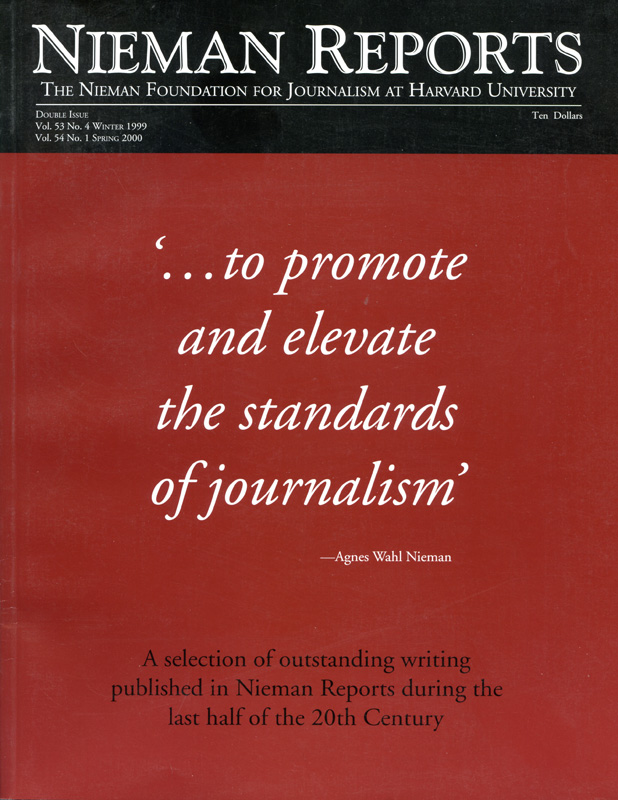[This article originally appeared in the July 1954 issue of Nieman Reports.]
Fiction writers have used a broad and inaccurate pen in painting the modern country editor as a grey-haired, old man wearing a green eyeshade, black muslin elastic-banded arm cuffs, and sitting at a battered, cluttered roll-top calmly smoking a curved pipe as he writes brilliant homey editorials.
Today’s country weekly editor may be all of these, although it is doubtful; he may be some of these, which is more probable; but almost surely he will have the cluttered desk. That is, unless he has a long arm and a large convenient wastebasket. For the handout, the unsolicited, generally useless press release, is with him always.
Through no fault of it own, the Post Office Department takes more time and space from the country editor than any other single organization. And it does it as systematically as it delivers the mail. Through rain and hail and sleet and snow, by ship and train and bus and sometimes plane, postmen deliver to the cluttered desk of the country editor piles of printed, mimeographed, duplicated and typewritten “news” that is utterly useless and unwanted. These are the handouts.
The handout is the written result of the paid publicist who has something to sell, an idea to peddle, a reminder to give, or sometimes (and this is a most wearisome and unfortunate circumstance) a good job to keep.
Thousands of reams of good paper are quickly swept into wastebaskets each month throughout this country. These are handouts. Most of them are useless; many of them are insults to the intelligence of the average man; their waste is criminal.
As an example of what these well-paid purveyors of information are doing to the editors of the approximately 1,800 dailies and 10,000 weeklies in the United States, let us look into the cluttered office of a weekly paper in a town of 6,000 in New Hampshire. This paper has a circulation of less than 2,500 and serves a community that is industrial, not agricultural. It has a full-time news staff of two, and it publishes approximately 10 pages each issue.
In order to get a fairly accurate picture of the handout situation, this writer requested the editor to save the content of his wastebasket for two weeks. At the end of 10 days the editor gave up. He complained that he was running out of storage space. Academic interest and all that sort of thing, he said, were all right and certainly commendable. But you could carry a good thing too far. The editor said the baskets on his desk were full, his wastebasket was overflowing, a cardboard carton of saved press releases was constantly in his way, and could he stop this damned nonsense and send the rest out to the waste paper baler.
So the handouts were gathered from his desk baskets, from the cardboard carton and from the wastebasket and sorted. All these releases were rejects, now; they did not include those which had been put aside for future perusal or which had been used in the two issues published during this 10-day period. Under normal circumstances they would have been taken to the back shop for the waste paper dealer.
After sorting and classifying, here is what was found. In a 10-day period the rejected press releases were equivalent to four printed books of 165 pages each. There were 149 releases from 68 different sources. There was the equivalent of 950 double-spaced typewritten pages or 245,000 words. This was an average of 95 pages of typewritten double-spaced copy each day. And all went into the wastebasket.
Evan Hill teaches journalism at Boston University and has written before on the weekly editor’s problems for Nieman Reports.
Fiction writers have used a broad and inaccurate pen in painting the modern country editor as a grey-haired, old man wearing a green eyeshade, black muslin elastic-banded arm cuffs, and sitting at a battered, cluttered roll-top calmly smoking a curved pipe as he writes brilliant homey editorials.
Today’s country weekly editor may be all of these, although it is doubtful; he may be some of these, which is more probable; but almost surely he will have the cluttered desk. That is, unless he has a long arm and a large convenient wastebasket. For the handout, the unsolicited, generally useless press release, is with him always.
Through no fault of it own, the Post Office Department takes more time and space from the country editor than any other single organization. And it does it as systematically as it delivers the mail. Through rain and hail and sleet and snow, by ship and train and bus and sometimes plane, postmen deliver to the cluttered desk of the country editor piles of printed, mimeographed, duplicated and typewritten “news” that is utterly useless and unwanted. These are the handouts.
The handout is the written result of the paid publicist who has something to sell, an idea to peddle, a reminder to give, or sometimes (and this is a most wearisome and unfortunate circumstance) a good job to keep.
Thousands of reams of good paper are quickly swept into wastebaskets each month throughout this country. These are handouts. Most of them are useless; many of them are insults to the intelligence of the average man; their waste is criminal.
As an example of what these well-paid purveyors of information are doing to the editors of the approximately 1,800 dailies and 10,000 weeklies in the United States, let us look into the cluttered office of a weekly paper in a town of 6,000 in New Hampshire. This paper has a circulation of less than 2,500 and serves a community that is industrial, not agricultural. It has a full-time news staff of two, and it publishes approximately 10 pages each issue.
In order to get a fairly accurate picture of the handout situation, this writer requested the editor to save the content of his wastebasket for two weeks. At the end of 10 days the editor gave up. He complained that he was running out of storage space. Academic interest and all that sort of thing, he said, were all right and certainly commendable. But you could carry a good thing too far. The editor said the baskets on his desk were full, his wastebasket was overflowing, a cardboard carton of saved press releases was constantly in his way, and could he stop this damned nonsense and send the rest out to the waste paper baler.
So the handouts were gathered from his desk baskets, from the cardboard carton and from the wastebasket and sorted. All these releases were rejects, now; they did not include those which had been put aside for future perusal or which had been used in the two issues published during this 10-day period. Under normal circumstances they would have been taken to the back shop for the waste paper dealer.
After sorting and classifying, here is what was found. In a 10-day period the rejected press releases were equivalent to four printed books of 165 pages each. There were 149 releases from 68 different sources. There was the equivalent of 950 double-spaced typewritten pages or 245,000 words. This was an average of 95 pages of typewritten double-spaced copy each day. And all went into the wastebasket.
Evan Hill teaches journalism at Boston University and has written before on the weekly editor’s problems for Nieman Reports.



